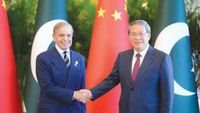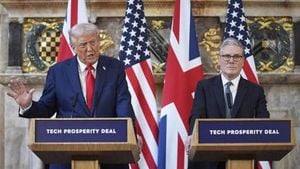Pakistan and China have taken a significant stride in deepening their economic partnership, signing bilateral accords worth $8.5 billion during the Second Pakistan-China B2B Investment Conference held in Beijing on September 4, 2025. The agreements, which span a diverse array of sectors such as agriculture, electric vehicles, solar energy, health, chemicals, petrochemicals, iron, and steel, mark a new era in the two nations’ already robust relationship. Prime Minister Shehbaz Sharif, addressing a packed audience of over 800 representatives from both countries, described the development as a "long march of economic growth," emphasizing the transformative potential of these deals for Pakistan's future.
The breakdown of the agreements includes $7 billion in Memoranda of Understanding and $1.54 billion in joint ventures, reflecting the growing appetite for collaboration between Chinese and Pakistani enterprises. According to the Associated Press of Pakistan, the conference was attended by over 300 Pakistani and 500 Chinese companies, signaling the scale and seriousness of the engagement. The presence of high-level officials, including Deputy Prime Minister Ishaq Dar and Pakistan’s Ambassador to China Khalil Hashmi, underscored the event’s significance.
In his keynote address, Prime Minister Sharif unveiled a bold new vision for bilateral economic cooperation, formally launching what he termed "CPEC 2.0." This next phase of the China-Pakistan Economic Corridor shifts the focus toward business-to-business (B2B) investments in high-growth sectors such as agriculture, information technology (IT), artificial intelligence (AI), minerals, and industrial relocation. Sharif was unequivocal about the direction of this new chapter, stating, “We will not tolerate a second’s delay. I recently ensured that a Chinese entrepreneur was facilitated within 24 hours. That’s the level of commitment I am talking about.”
This message of urgency and partnership was reinforced throughout Sharif’s speech. He assured Chinese investors of Pakistan’s unwavering dedication to removing bureaucratic barriers and ensuring a smooth investment climate. "Pakistan is your second home, just as China is ours," he declared, highlighting the closeness of the relationship. The prime minister also made clear that the safety of Chinese citizens and investments in Pakistan remains an absolute priority, a sentiment echoed by Chinese President Xi Jinping during a meeting with Sharif earlier in the week. “The safety of Chinese citizens is paramount,” Sharif reiterated on September 4, according to Anadolu Agency.
Sharif’s remarks were not just about the present or future; he also reflected on the journey so far. He credited the original CPEC agreement, signed in 2015 during President Xi’s historic visit, with transforming Pakistan’s energy landscape. “We were facing up to 20 hours of power outages daily. Today, thanks to President Xi’s dynamic and visionary leadership, Pakistan became energy self-sufficient. That was the turning point,” he noted. The first phase of CPEC, a flagship of China’s Belt and Road Initiative, is widely recognized for revitalizing Pakistan’s infrastructure and energy sectors, paving the way for the new investments now being announced.
The prime minister’s vision for CPEC 2.0 is ambitious. Special Economic Zones (SEZs) are central to the plan, offering competitive advantages such as affordable skilled labor and opportunities for joint ventures aimed at producing high-quality export goods. Sharif specifically highlighted agriculture as a sector ripe for modernization, noting that it employs 60% of Pakistan’s population. "China has excelled in this field, and we seek your partnership to modernize our agricultural practices and increase exports," he urged Chinese investors, as reported by state media.
Beyond economics, the symbolism of the partnership was on full display. Sharif described the China-Pakistan relationship as “unmatched, higher than the Himalayas, deeper than the deepest oceans, sweeter than honey, and stronger than steel.” Such poetic language, while striking, reflects the longstanding strategic alignment between the two nations. Since the establishment of diplomatic ties in 1950, Beijing and Islamabad have described their relationship as an “all-weather strategic cooperative partnership.” China has become Pakistan’s largest arms supplier, and bilateral trade volume surpassed $23 billion in 2024, according to Anadolu Agency.
Sharif’s six-day official visit to China was packed with high-level engagements. On September 4, he met with Chinese Premier Li Qiang in Beijing, reaffirming the “iron-clad” nature of their strategic partnership. Both leaders expressed satisfaction with the positive trajectory of relations and discussed the importance of early implementation of key projects such as the ML-1 railway upgrade, the Karakoram Highway (KKH) realignment, and the operationalization of Gwadar Port. These infrastructure projects are seen as vital to unlocking Pakistan’s economic potential and further integrating its economy with China’s vast Belt and Road network.
The two sides also agreed to intensify cooperation across five new corridors under CPEC 2.0 and to continue working closely on science and technology, IT, media, and agriculture. The upcoming 75th anniversary of the establishment of diplomatic ties in 2026 was noted as a milestone to be celebrated, with both countries aiming to deepen their partnership even further.
Sharif’s speech was not without personal reflection. He recalled his first visit to China in 1982, remarking, “Even back then, I said China is suffering from success, not failure. Today, China is the second-largest economy and a global military power, having lifted over 700 million people out of poverty. This is the model I want to borrow and replicate in Pakistan.” He praised President Xi Jinping’s leadership in promoting multilateralism and shared prosperity, saying China’s achievements have changed the destinies of many nations.
Before departing Beijing on September 5, Sharif attended the 25th Summit of the Shanghai Cooperation Organization Heads of State and the celebrations marking the 80th anniversary of the World War Against Fascism. At the airport, he was seen off by Han Xerong, a senior member of the Beijing Municipal Committee, and Pakistan’s diplomatic staff, closing out a visit that many observers see as pivotal for Pakistan’s economic future.
With the signing of these new accords and the launch of CPEC 2.0, Pakistan and China are not only reaffirming their strategic partnership but are also betting on a shared vision of growth and modernization. As both governments look ahead to the 75th anniversary of their diplomatic ties, the message from Beijing is clear: this “long march of economic growth” is just getting started.





